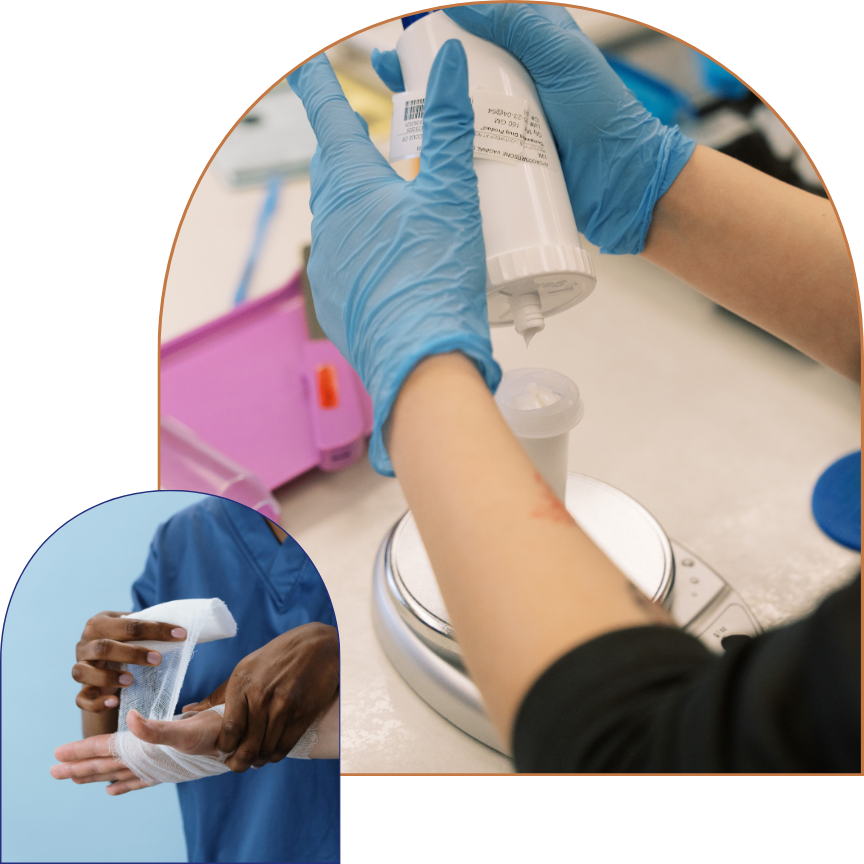A Compounding Pharmacy’s Role in Wound Care
Explore how Central Ohio Compounding Pharmacy supports wound care with customized medications for wounds, burns, ulcerations, donor sites, and skin irritation.

Table of Contents
A Compounding Pharmacy’s Role in Wound Care
Central Ohio Compounding Pharmacy offers tailored solutions for wound care, providing personalized formulations to meet each patient’s specific needs. These compounded medications are particularly beneficial for complex or difficult-to-manage wounds, enhancing comfort and promoting healthy skin.
Understanding Wounds
Wounds can vary from minor cuts to serious injuries that require specialized medical care. Proper management is essential to reduce complications, alleviate discomfort, and support skin recovery.
Types of Wounds
- Acute Wounds: Injuries like cuts, scrapes, or punctures that heal relatively quickly with appropriate care.
- Chronic Wounds: Conditions like diabetic ulcers or pressure sores that require ongoing management.
- Surgical Wounds: Incisions made during medical procedures that must be managed to minimize infection risks.
Compounded medications play a key role in addressing the unique challenges associated with wound care, particularly for non-healing or complex wounds.
Ulcerations
Ulcerations are chronic wounds that often develop due to poor circulation, pressure, or underlying medical conditions. These wounds can become severe without proper care.
Common Types of Ulcerations
- Diabetic Ulcers: Frequently seen in individuals with diabetes, particularly on the feet.
- Pressure Ulcers: Commonly referred to as bedsores, these are caused by prolonged pressure on the skin.
- Venous Stasis Ulcers: Resulting from poor blood flow in the veins, often affecting the legs.
Compounded medications for ulcerations may include:
- Topical Antibiotics: To manage bacterial growth.
- Hydrating Gels: To maintain a moist wound environment, aiding skin recovery.
- Pain-Relieving Creams: To alleviate discomfort associated with ulcerations.
Burns
Burn injuries can vary in severity and require specific care to prevent infection and manage pain. Compounded medications provide tailored solutions based on the burn’s severity and location.
Common Applications for Burn Management
- Moisturizing Creams: To prevent dryness and support skin recovery.
- Antibacterial Ointments: Reducing the risk of infection in damaged tissue.
- Cooling Gels: Providing soothing relief for minor burns.
By offering personalized formulations, compounding pharmacies ensure that burn management aligns with the individual needs of patients.
Donor Sites
Donor sites, where skin is removed for grafting, are prone to discomfort and require specialized care. Compounded medications can address the unique challenges associated with these areas.
Compounded Medications for Donor Sites
- Pain Relievers: Topical formulations containing lidocaine or other anesthetics to reduce discomfort.
- Antimicrobial Solutions: To prevent infection and maintain clean donor sites.
- Moisturizing Agents: Supporting skin hydration and minimizing scarring.
These medications provide targeted support, promoting better outcomes for patients undergoing skin graft procedures.
Odor Control
Certain wounds, particularly chronic or infected wounds, can produce unpleasant odors that impact a patient’s quality of life. Compounded medications can help address this issue.
Addressing Odor in Wound Care
- Antimicrobial Powders or Gels: To reduce bacteria contributing to odor.
- Activated Charcoal Formulations: To neutralize odors at the wound site.
- Custom Deodorizing Creams: Designed to be gentle on sensitive or inflamed skin.
These solutions ensure that wound care is not only functional but also improves the patient’s overall comfort and dignity.
Skin Irritation
Wound care products and prolonged exposure to bandages or adhesives can lead to skin irritation, complicating the healing process. Compounded medications are an excellent option for managing sensitive or irritated skin.
Options for Reducing Irritation
- Barrier Creams: To protect the skin from adhesives and external irritants.
- Anti-Inflammatory Ointments: Containing agents like hydrocortisone to soothe irritation.
- Custom Moisturizers: For rehydrating dry or inflamed areas around the wound.
These formulations provide relief while supporting the overall management of the wound area.
Examples of Compounded Medications for Wound Care
Compounding pharmacies create customized medications to address the diverse needs of wound care. Examples include:
Antibacterial and Antifungal Ointments
- Formulations targeting bacterial or fungal infections commonly seen in chronic wounds.
Hydrogels
- Designed to maintain moisture in the wound environment, promoting optimal skin recovery.
Topical Anesthetics
- Providing localized relief from pain or discomfort without affecting the entire body.
Combination Creams
- Combining multiple agents, such as antibiotics and anti-inflammatories, for comprehensive care in a single application.
Deodorizing Powders
- Neutralizing unpleasant odors associated with chronic wounds while minimizing skin irritation.
These compounded medications offer flexibility in dosage and delivery, ensuring that both patients and providers have access to options that meet their specific needs.
For specific formulations, ask our pharmacists.
Why Choose Central Ohio Compounding Pharmacy for Wound Care?
Central Ohio Compounding Pharmacy provides tailored wound care solutions for patients. From customized medications for burns and ulcerations to deodorizing and irritation-reducing formulations, COCP collaborates with providers to deliver medications designed for individual care plans. By combining expertise and innovation, COCP helps patients achieve better comfort and outcomes in wound care management.
